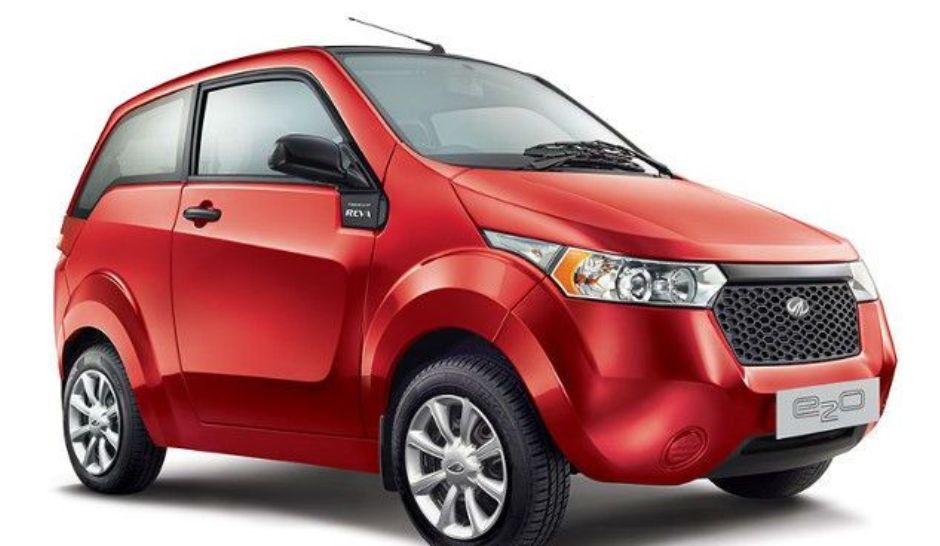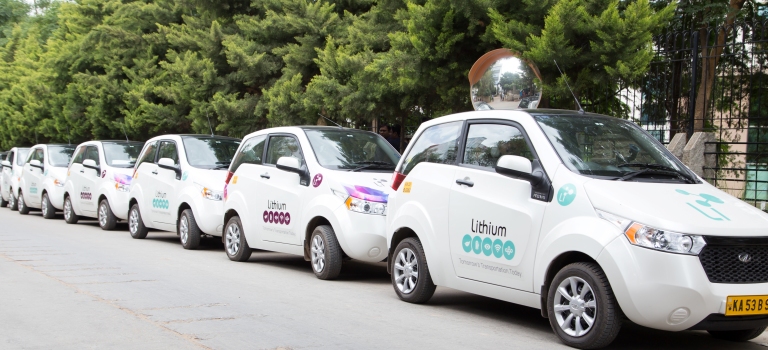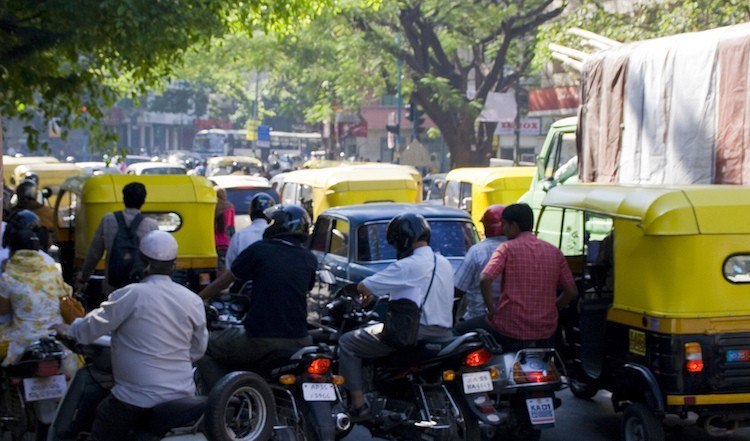
Photo credit: Automobile Italia
A battery-operated car has often been a source of curiosity and amusement in India. A country that loves big, flashy, fuel-guzzling vehicles that can flex some muscle on the road has not been known to care for the tiny electric car that could do it a world of good.
But one transportation startup decided to change the script one-and-a-half years ago and stepped into India’s Silicon Valley, Bangalore.
Lithium Urban Technologies was launched in June 2015 with 40 electric cars. It was billed as India’s first 100 percent electric solution for corporate transport – that is, it would operate cabs for corporate clients.
Today the cloud-based service has a 200-strong fleet of Mahindra E2O hatchbacks, is set to induct more electric car varieties, and is eyeing newer cities.

The Lithium fleet in Bangalore.
“We have proved that electric vehicles are capable of replacing ICE (internal combustion engine or fossil fuel-based) vehicles in heavy duty cycle, high mileage, and business critical applications,” Lithium founder Sanjay Krishnan tells Tech in Asia.
Four tenets are helping Lithium get ahead in urban transportation: clean, shared, distributed, and connected. “We have built our business and process around these four tenets,” says Sanjay.
That funny car
The Mahindra Reva E2O is India’s first and most well-known fully electric car. But its takers are mostly limited to green enthusiasts.
Even though it can be highly effective in congested and polluted cities, regular car buyers scoff at its tiny size, odd shape, and price, which seems high for a four-seater. Another concern is the practicality of buying a vehicle that could run out of charge in the middle of the road without a charging station in sight.
So, what made the founders of Lithium go for the Mahindra E2O?
“It is a good car, the cheapest electric vehicle, and the safest hatchback on Indian roads,” says Sanjay. “The equipment manufacturer worked with us extensively to ensure its success as a commercial or fleet vehicle.” The car can do around 120 kilometers on a full charge.

Lithium founder Sanjay Krishnan.
Sanjay admits that Indian consumers are apprehensive of electric vehicles. “These face barriers in the eyes of consumers with regard to charging time, battery replacement costs, and driving range.”
But that’s why plying its fleet for corporate houses has been a great idea. “Corporate investment enables sustainability and cost-effectiveness.”
The B2B space
It helps that Bangalore is a hub for global companies with large campuses. Many of Lithium’s clients are multinationals that spend large amounts on transporting employees to and from office.
Plus Bangalore has huge traffic problems. The city has at least 1.5 million vehicles, with some roads operating up to five times their capacity in terms of vehicular volume.
So a small car that could zip around in congested areas makes sense. Lithium cabs have cloud-based GPS and panic buttons for safety, and therefore also offer a good alternative to ICE cabs.
“The challenge was to create an infrastructure that was nearly non-existent but we were determined to be the first mover and make the point,” says Sanjay.
One of the biggest challenges was charging stations and power availability to charge the car batteries. Here too, being in the B2B space helped.
Lithium has managed to set up 200 charging stations in the city, many on sprawling corporate campuses. “Charging points placed at corporate campuses make it more convenient to cater to this segment,” says Sanjay.
Another big challenge was convincing clients that electric vehicles were capable of replacing the incumbent fleet (of ICE vehicles), and that Lithium, as a startup, would be capable of matching their requirements.

The chaotic roads of Bangalore. Photo credit: Eirik Refsdal
But Bangalore being the playground of Uber and Ola, isn’t the competition fierce? “We don’t see Ola, Uber or others in the public transportation space as competition, but just as others who are trying to solve the same problem with another solution.”
Zipping around
Lithium has customized plans for different clients, depending on the number of cars deployed. It is partly angel-funded.
Sanjay credits urban planning and transportation experts like co-founder Ashwin Mahesh and Reva founder Chetan Maini for Lithium’s success. Both are co-promoters of the startup.
“We’ve had great market traction not because we are green, but because of our game-changing business model, which ensures high fleet productivity, low operating costs, coupled with high assurance (meaning transparency, compliance, safety and security),” says Sanjay.
The company is set to induct the Mahindra eVerito and the Renault Zoe in the next few months, and is planning to set up charging infrastructure all over Bangalore.
What’s more, the highly polluted and crowded national capital region is on Lithium’s agenda. “We have plans of moving to other cities too, and Delhi (National Capital Region) is on our radar.”
This post Who says India can’t love electric cars? Just ask this startup appeared first on Tech in Asia.
from Tech in Asia https://www.techinasia.com/lithium-runs-electric-cabs-in-india
via IFTTT
No comments:
Post a Comment